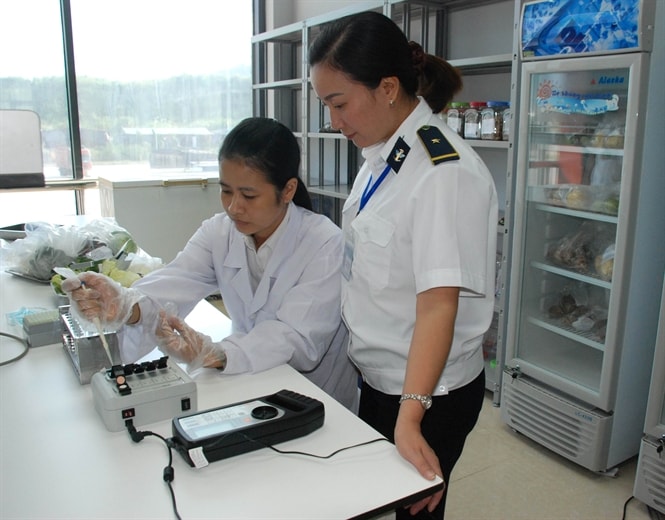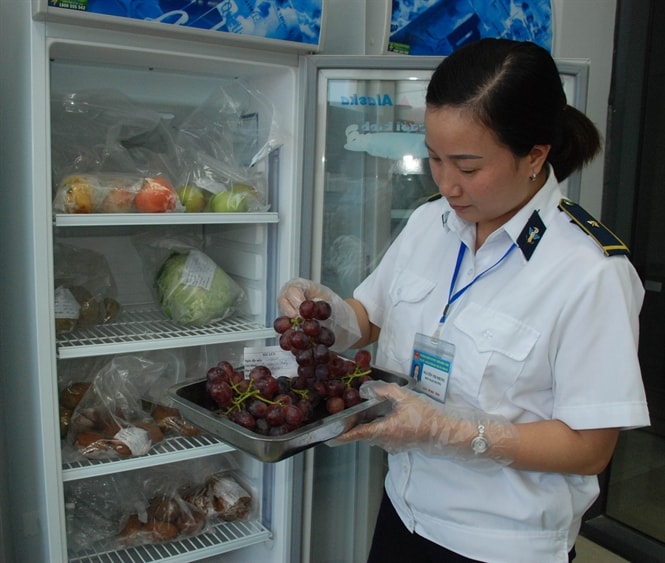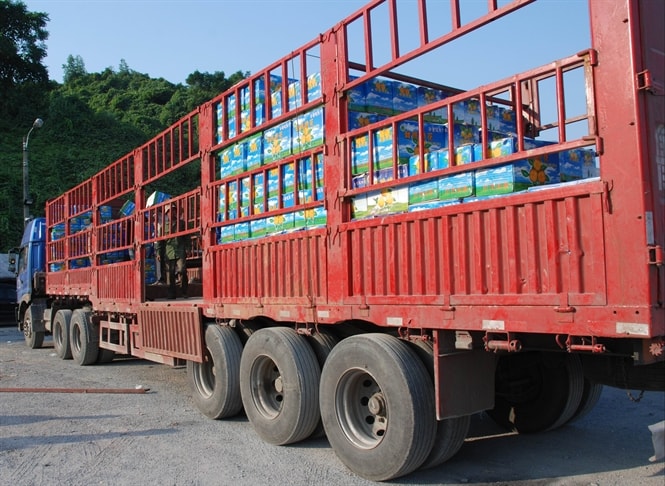Agricultural products still have easy access to China
In recent years, Chinese agricultural products imported into Vietnam have decreased significantly, while Vietnam's exports to China are increasing sharply.
Every year at Lao Cai border gate, nearly 1 million tons of agricultural, forestry and food products are imported and exported here. Most of them are exported from Vietnam to China, imported goods are vegetables, fruits and some flowers, the quantity is not much...
 |
| Quickly check the goods sample at Kim Thanh border gate before customs clearance procedures |
To ensure food hygiene and safety for consumers, the Plant Quarantine Sub-Department of Region VIII (Plant Protection Department, Ministry of Agriculture and Rural Development) has strengthened quarantine measures for imported goods from China to Vietnam...
Lao Cai border gate connects with 12 provinces in Southwest China, a large area with nearly 400 million people. Since 1999, China has implemented the policy of "Great Western Exploration", so the demand for Chinese consumption and products in this area has become more and more diverse and abundant.
Vietnam has become a supplier of agricultural products as well as a consumer of goods for this region in large quantities. However, in recent years, the import of Chinese agricultural products into Vietnam has decreased significantly, while the export of Vietnamese goods to China has increased sharply.
 |
| Sample of shipments |
According to statistics of the Plant Quarantine Sub-Department of Region VIII, the imported and exported goods with contracts that the Sub-Department conducted quarantine from January 1, 2014 to September 30, 2014 were 12,628 shipments with a total volume of 666,616 tons.
In the third quarter alone, regarding exports: 25,547 tons of fresh lychee, 8,983 tons of dried cassava slices, 1,920 tons of green bananas, 104,659 tons of peeled wood, 1,098 tons of rice, 389 tons of rambutan, 429 tons of fresh lemons... Total export volume in the third quarter was 147,282 tons.
Regarding imports: 2,859 tons of pomegranates, 2,250 tons of cabbage, 1,716 tons of grapes, 1,665 tons of fresh peaches, 1,652 tons of Chinese cabbage, 1,585 tons of fresh apples, 929 tons of cauliflower... Total imported goods in the third quarter were 24,752 tons. These are traditional products that Vietnam imports from China seasonally.
Many years ago, the amount of imported goods was always larger than the amount of exported goods, but in recent years, the amount of exported goods has been many times larger than the amount of imported goods. In the first 6 months of 2014, 391,607 tons were exported, reaching 60.2% of the plan, an increase of 88% compared to the first 6 months of 2013. By the end of the third quarter of 2014, the total amount of Vietnamese agricultural products exported to China was 538,890 tons, reaching 89.8% of the plan.
Meanwhile, the imported agricultural products in the first 6 months of the year were only 17,767 tons, and by the end of the third quarter of 2014, it was 42,519 tons, reaching nearly 90% of the plan. Thus, the imported goods by the end of 2014 will hardly exceed 60,000 tons.
It is worth mentioning that in previous years, imported potatoes were 30,000-40,000 tons/year, but now it has decreased to only 6,000-7,000 tons/year. Specifically, in the first 9 months of 2014, the total amount of imported potatoes was only 1,655 tons.
Faced with public opinion that agricultural products imported from China into Vietnam are "bathed" in chemicals and pesticide residues, the Plant Quarantine Department of Region VIII has strengthened quarantine measures for imported goods.
Ms. Nguyen Thi Nhung, Deputy Head of Kim Thanh Plant Quarantine Station, said: All imported agricultural products with contracts to Vietnam must be quarantined before going through customs clearance. The owners must present all the procedures of origin and quarantine papers from the other side.
The station conducts disease inspection and rapid testing. If any shipment is suspected of being contaminated with chemicals and pesticide residues, the samples will be sent to the Technical Department of the Sub-Department for further inspection. In 2014, Kim Thanh border gate has not detected any shipments contaminated with chemicals and pesticide residues exceeding the permitted threshold.
.
In the third quarter of 2014, the Plant Quarantine Sub-Department of Region VIII made a record and fined the owner of the goods for importing a batch of goods without a clear origin and contract, fined 20 million VND, and forced them to be destroyed.
Mr. Nguyen Van Tuan - Head of the Plant Quarantine Sub-Department of Region VIII: "Every year, the Plant Quarantine Sub-Department of Region VIII regularly exchanges information with the Hekou Quarantine - China about pests as well as chemical residues and pesticides that Vietnam prohibits from importing. Many shipments of unknown origin have been refused to complete export procedures. This means that the Chinese side is also concerned that if the goods are returned, the owner will sue. Therefore, they must conduct strict inspections before exporting to Vietnam."
If the shippers buy goods in China to import to Vietnam, the Hekou Quarantine will not carry out quarantine procedures. Those shipments are forced to be re-exported or destroyed, so the shippers do not dare to take the risk.
Talking to Mr. Nguyen Quang Hoa, who just completed the procedures to import a shipment of nearly 20 tons of crispy persimmons from China to Ho Chi Minh City, he said: "For the past few years, I have been importing crispy persimmons and some fruits to supply to some southern provinces.
I went to China where people grow this rose variety to check what kind of pesticides they use. If the pesticides are banned in Vietnam, I refuse to import them.
Chinese farmers not only export to Vietnam but also to other countries and consume domestically. If they "bathe" in chemicals as some Vietnamese newspapers have reported, who do they sell to or are they poisoning themselves?
As importers, we must comply with Vietnamese regulations. If goods contaminated with chemicals are exported back to China and you do not accept them but destroy them, will we go bankrupt?
Therefore, the goods we import must ensure safety for ourselves and for domestic consumers."
 |
| Chinese cargo trucks parked at Kim Thanh border gate chemical yard |
Observing the imported crispy persimmons, they are all placed in cardboard boxes, many of which are still powdery, which proves that Chinese farmers are very careful in harvesting and preserving them. If the fruit is crushed, it cannot be exported and is difficult to transport over long distances.
According to NNVN






